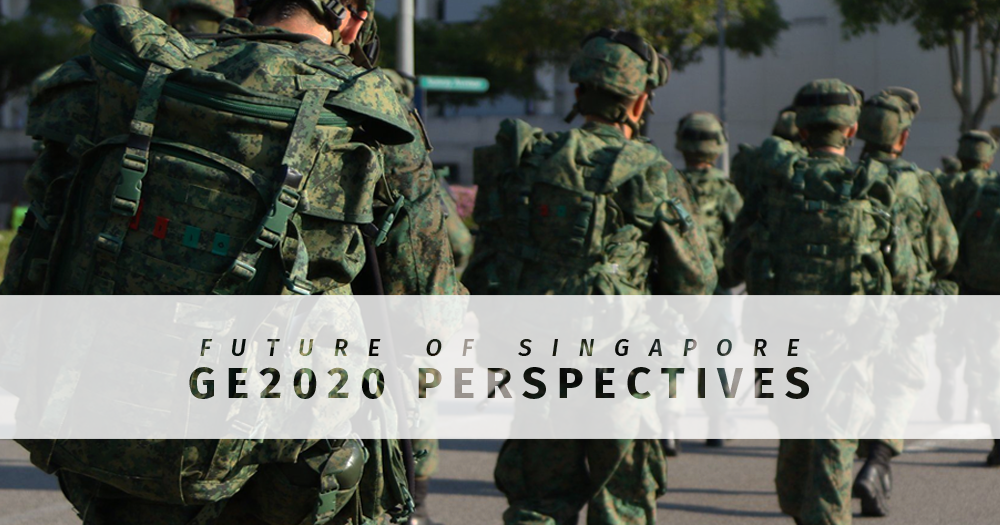FUTURE OF SINGAPORE: GE2020 PERSPECTIVES
Are there grounds for a young Singaporean to be optimistic about post-Covid-19 Singapore?
We invite Singaporeans to share their hopes and anxieties for our future, including their thoughts on leadership and pressing social issues that are close to the hearts of the younger generation.
Writing for Mothership, Samuel Ling Wei Chan, author of Aristocracy of Armed Talent: the military elite in Singapore, tackles the question of "Why do we still need NS in a Covid-19 Singapore?" and offers his take on how this pandemic could very well affect how we view defence.
By Samuel Ling Wei Chan
“Can the Singapore Armed Forces (SAF) fight?”
“Why do we still need NS?”
These questions arise with greatest frequency during informal conversations with Singaporeans residing overseas. Such queries – whether genuine or red herrings – remain current and relevant for defence in a Covid-19 world.
“Can the SAF fight?” This question can be ‘innocent’; but it can also be ‘loaded’. Singapore certainly did not fare well in Independence Day: Resurgence.
Banter aside, the meaning of fight – and the concomitant task of preparation – has evolved along with the changing ‘threatscape’.
The possibility of masse-en-masse confrontation with neighbouring states remains the raison d’etre for the military’s current force structure of a six-division army, a four-command air force, and a two-fleet navy. War in its traditional form was most likely entertained in the early years of independence and subsequently amplified with events in Indochina.
Incidences over the years have at times pushed limited military operations into the national consciousness.
Nevertheless, the war of words has replaced words of war even as Singapore’s geographical location remains unchanged.
The city state today possesses the most technologically-advanced defence force in Southeast Asia. Neighbouring state failure has in all likelihood replaced their use of military means for statecraft as Singapore’s greatest concern.
So “why do we still need NS?”
The simple answer is, and always will be, the access to affordable manpower. Manpower to support the current structure of divisions, commands, and fleets. In short, to remain prepared for war, and in doing so, to deter its possibility.
Critics will certainly highlight that contemporary defence requirements, while multifaceted, are increasingly specialised domains with almost no place for conscripts: special operations, expeditionary operations, cyber operations, space operations, artificial intelligence, and the development of autonomous weapons systems.
Such a view may hold true, but it is also irrelevant as there will always be manpower-intensive requirements such as parades, guard duty, ad hoc operations as the Covid-19 pandemic has shown, and of course training for war.
The business of defence remains costly in terms of land, labour, and capital even with conscription. The maintenance of the current system, however, holds various benefits for defence bureaucrats and the political establishment.
Conscription provides the defence community with a large pool from which to recruit regular personnel. Conscription also maintains a force structure essential to: sustaining the indigenous defence industry, the development of leaders, and the associated rank structure from which generals and admirals are made.
Such networks of power, established trust, and leadership qualities pegged to rank and appointment further present the political establishment with a pool of potential parliamentarians and ministerial-calibre candidates.
The Covid-19 pandemic will leave its mark on defence in three distinct ways.
First, the duration of ‘distancing’ measures and possible waves of infections will invariably disrupt training regimes, cohesion activities, and daily interaction among service personnel.
Large scale exercises overseas designed to sharpen and validate combat skills were disrupted this year, and the associated deterrent factors gleaned from of a well-honed public relations campaign conspicuously absent.
Affirmations of bilateral and multilateral ties from various countries are currently as good as it gets. Singapore’s military operational readiness remains intact for now.
Second, the Covid-19 pandemic also throws up possible manpower conundrums over regular service.
Certain conscripts and recent graduates could view the military organisation as an option for stable employment. By the same token, regulars who were intending to leave active service will almost certainly shelve, or at least delay, their intentions given the wider economic conditions.
This development is double-edged. On one hand, reluctance is not exactly a welcomed virtue among any organisation, let alone the military. On the other, such circumstances could very well retain some individuals who would rise to the upper echelons in due time.
Finally, will Singapore’s expeditionary posture change when a redefined normality is established? This is very much anyone’s guess at the moment.
The long years of deploying troops to support missions under the ambit of the United Nations from the 1970s to 2000s gradually gave way to American-led operations in Afghanistan and Iraq. Parliamentary debates on such use of military assets in pursuit of Singapore’s national objectives are probably available given the Republic’s democratic character.
The upcoming general elections could very well lead to changes in certain aspects of defence policy, depending on the distribution of seats. However, the scant attention given to defence in the manifestos of the political parties suggests that this is not a priority across which battlelines are drawn.
Not for the moment at least.
About the author: Samuel Chan, a Singaporean, is an Adjunct Senior Lecturer at UNSW Canberra. He teaches at the Australian Defence Force Academy, and is the author of Aristocracy of Armed Talent: the military elite in Singapore. He has been doing research on the SAF since 2009.
Top photo via Singapore Army/FB.
If you like what you read, follow us on Facebook, Instagram, Twitter and Telegram to get the latest updates.
